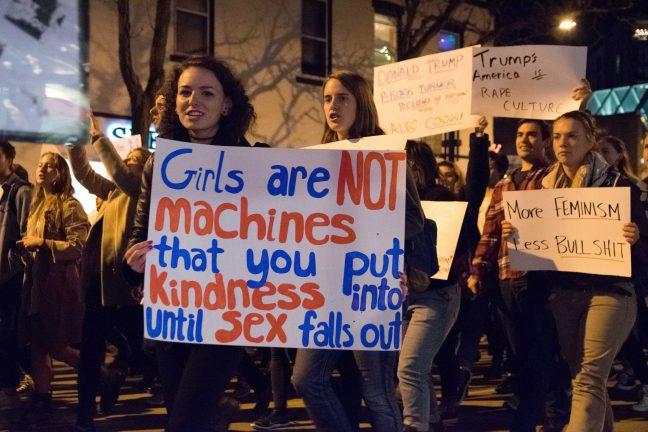The culture and conversation surrounding sex are becoming increasingly more complex.
Stereotypes suggest a proper young lady would never discuss sex, while boys, on the other hand, are lauded for it. Today this imbalance is more present than ever — the way America sexually socializes its adolescence is in part responsible for the eminent rape culture because it promotes double standards across genders. Girls shouldn’t be chastised for taking part in sexual experiences when they are regarded as status symbols for boys.
Sex is common and the conversation regarding it needs to change — double standards and discourse aside.
According to the Centers for Disease Control and Prevention, 41 percent of high schoolers in the United States have had sexual intercourse. Out of those students, 43 percent did not use a condom. America’s sex education is severely inadequate, in both structured education and socialization. The fact of the matter is youth have sex. The absence of conversations regarding this truth only adds to the unhealthy and unsafe outcomes of being uneducated in sex.
As current generations grow up in the height of technology, media plays a critical role in their sexual socialization. The media portrays sex as something fun and exciting, which it can be. But the media fails to incorporate safe sex.
Often the sexual acts shown are spontaneous and, therefore, unprotected. Coercion is sometimes used and questionable male behavior is normalized. This results in adolescents not knowing what safe sex and healthy relationships at their age look like. This lack of knowledge has led to one in ten female high school students being forced into having sex, with 13 percent of these females experiencing dating violence. Unfortunately, these statistics only rise with age.
In the U.S., the likelihood of a woman being assaulted increases if they are a college student. According to Rainn, the nation’s largest anti-sexual violence organization, one-third of female college students experience sexual assault. The U.S. continues to see sexual assault and dating violence across age groups because rape culture is socialized into America’s youth at a young age.
Simultaneously, boys are taught that sex equates to masculinity and “coolness,” while girls learn to carry pepper-spray and hold their keys in between their knuckles as they walk home. There are clear gender differences in learned sexual normalities. A realistic and productive first step to change this is to create a space for women to talk about sex.
This does not refer to a sex talk in a dingy basement with fold up chairs. It refers to making a space in society where female conversations about sex are not undermined. Too many women are afraid to speak up about their sexuality because of the guilt or embarrassment they feel for being sexually active or for their sexual exploration. It shouldn’t be like this.
If people were more transparent about their vast array of sexual experiences and expressions, then the clear signs of abuse, assault or general unconsented actions could be more easily found. When someone feels dirty or uncomfortable about what happened during a sexual encounter, something is not right.
Knowledge is power. When someone knows the line between an awkward new experience and sexual misconduct, that line is less likely to be crossed, making students safer and more educated about their bodies. Sex and relationships are supposed to be fun and add to your happiness, not take away from it.
Imagine if girls during puberty — the blossoming of their sexual intrigue — were taught about sex in a comprehensive and non-judgemental manner. These girls would grow into sexually informed and empowered women. Their ability to talk in a public setting about sexuality would translate to similar discussions in private settings, creating a dialogue around sexual experience. In turn, this would mean creating a society where continuous and enthusiastic consent was the norm. This shift requires a social change and it’s rooted in the sex-positivity movement.
The sex-positivity social movement is a great way to fight back against rape culture. Feminist Campus defines sex-positivity as “the belief that consensual sexual expression is both healthy and important in contributing to a safe and inclusive campus climate.” Sex-positivity also focuses on ending slut-shaming and victim blaming, which actively combats rape culture and unhealthy sexual activity. This movement is not limited to the scope of college students, and can be applied across the U.S.
But college campuses are hotspots for future families, so it’s imperative to shift the sexual environment here. For any tangible change, society must bring up the next generation and those after in a sex-positive environment.
To take the first step in implementing this change — let’s talk about sex.
Speaking to trusted peers or family is the only way to break down the barriers society has built up regarding sexual experiences. The way the U.S. sexually socializes its children needs to change — no more normalization of poor male behavior, no more shaming women for being sexually active. University of Wisconsin needs sex-positivity now more than ever.
Emiliana Almanza Lopez (almanzalopez@wisc.edu) is a sophomore majoring in sociology and environmental science


